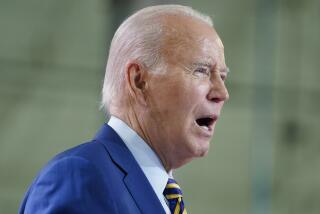Health Care Reform: Tough, but Stay With It : Let this one get away and watch the deficit boom anew
- Share via
Unsettling new data on U.S. health care spending provides a vivid indication of the big challenge that President-elect Bill Clinton faces in fulfilling his campaign promise to rein in medical costs. Huge increases in the health care bill will continue to cost consumers and business dearly unless the medical system is overhauled.
Health care is Clinton’s toughest challenge, but it should nevertheless stay high on the list of domestic priorities that the President-elect and his new economic team review when they meet in Little Rock Thursday to go over final options on how to boost the economy. Exorbitant health care costs are sapping the nation.
Clinton said it at his economic conference last month: “We are kidding each other, we are all just sitting here making this up, if we think we can get control of this budget if we don’t do something about health care. It’s going to bankrupt the country.”
The President-elect has yet to flesh out his campaign proposal of “managed care” networks that would be financed by employers for their employees and by the government for people who have no jobs.
SHRINKING AMBITION: The statistics just out should provide information helpful in shaping and refining a plan. Clinton’s proposal may undergo considerable retooling; his key advisers are now saying that the deficit is forcing him to scale back plans to repair roads and other parts of the infrastructure.
Spending on health care in 1992 accounted for a record 14% of the gross domestic product, a figure that is substantially higher than those of other industrialized countries. The Commerce Department reported in its “1993 U.S. Industrial Outlook” that health care spending rose to $838.5 billion in 1992, up 11.5% from the year before. That represents $3,160 for every man, woman and child in the United States--a nation in which 37 million people have no medical insurance.
Spending is expected to grow to $939.9 billion this year. “Expenditures are projected to rise by 12% to 15% a year during the next five years unless significant changes in the health care delivery system occur,” the Commerce Department said.
If the system is left as is, access will remain limited, costs will skyrocket and quality of health care will remain uneven. Medical expenses will become an even greater burden for businesses, large and small, which foot the bill for more than a third of the nation’s health care.
With so many people losing jobs in hard economic times, especially in California, thousands more are joining the ranks of the uninsured. Many of those fortunate enough to have coverage are finding it reduced.
EXPLODING DEFICIT: Higher medical bills only add to the burgeoning deficit, which is putting limits on the ambitious programs set forth by Clinton during the campaign. Even so, health care spending is eating up so much of the nation’s output that dealing with this mammoth problem can’t wait. It will be difficult for Clinton to handle the intense jockeying among various insurance, medical, employer and consumer interests--but he must do it. Ever-increasing health care costs are hurting the nation’s competitiveness. Getting medical costs under control would free up dollars for investments in education, transportation and jobs.
It won’t be any easier a year from now to begin to reform the health care system. So Clinton might as well start this year.
Powerful vested interests will seek to frustrate health care reform. At some point the young President from Arkansas will have to make hard choices, bend a few arms and perhaps even make a few enemies in the course of trying to make America work better. This is called presidential leadership, and the complex health care issue may provide the Administration with its first stern domestic-issue test.
More to Read
Sign up for Essential California
The most important California stories and recommendations in your inbox every morning.
You may occasionally receive promotional content from the Los Angeles Times.












